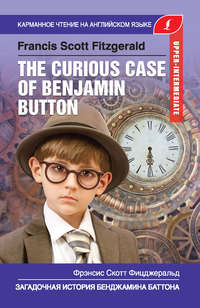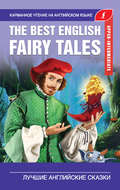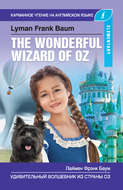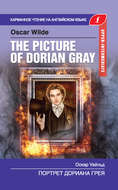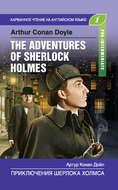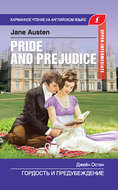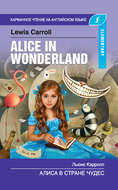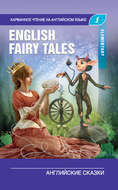Kitabı oku: «Загадочная история Бенджамина Баттона / The Curious Case of Benjamin Button», sayfa 3
There was nothing for Benjamin to do but follow with as much dignity as possible, promising himself revenge.
But this revenge did not materialize. Two days later, however, his son Roscoe materialized from Baltimore, hot and angry from a long trip, and escorted the weeping general back to his home.
In 1920 Roscoe Button’s first child was born. During the festivities16, however, no one mentioned “the thing” that the little boy, surely about ten years old who played around the house with lead soldiers, was the new baby’s own grandfather.
No one disliked the little boy whose fresh, cheerful face had just a hint of sadness on it, but to Roscoe Button his presence was unbearable. It seemed to him that his father refused to look sixty. Indeed, to think about the matter for as much as a half an hour drove him insane.
Five years later Roscoe’s little boy grew old enough to play childish games with little Benjamin under the supervision of the same nurse. Roscoe took them both to kindergarten on the same day, and Benjamin found that playing with little strips of coloured paper, making chains and curious and beautiful designs was the most fascinating game in the world. Once he was bad and had to stand in the corner—then he cried—but there were mostly gay hours in the cheerful room, with the sunlight from the windows and Miss Bailey’s kind hand resting for a moment now and then in his hair.
Roscoe’s son moved up into the first grade after a year, but Benjamin stayed on in the kindergarten. He was very happy. Sometimes when other children talked about what they would do when they grew up, he turned very sad as if he realized that those were things he would never have.
He went back a third year to the kindergarten, but he was too little now to understand what the bright strips of paper were for. He cried because the other boys were bigger than he, and he was afraid of them. The teacher talked to him, but though he tried to understand, he could not understand at all.
He was taken from the kindergarten. His nurse, Nana became the centre of his tiny world. On bright days they walked in the park; Nana would point at a great gray monster and say “elephant,” and Benjamin would say it after her, and when he was being undressed for bed that night he would say it over and over aloud to her: “Elyphant, elyphant, elyphant.” Sometimes Nana let him jump on the bed, which was fun, because if you said “Ah” while you jumped you got a very funny vocal effect.
He loved to take a big cane and hit chairs and tables with it and saying: “Fight, fight, fight.” When a long day was done at five o’clock he would go upstairs with Nana and be fed oatmeal and nice soft food with a spoon.
There were no troublesome memories in his childish sleep. There were only the white, safe walls of his crib, Nana, a man who came to see him sometimes, and a great big orange ball that Nana pointed at and called “sun.” When the sun went down, his eyes were sleepy—there were no dreams.
The past—the war; the first years of his marriage when he worked late down in the busy city for young Hildegarde whom he loved; the days before that when he sat smoking in the gloomy old Button house on Monroe Street with his grandfather—all these had faded from his mind as though they had never been.
He did not remember. He did not remember clearly whether the milk was warm or cool at his last feeding or how the days passed—there was only his crib and Nana.
And then he remembered nothing. When he was hungry, he cried. That was all. He breathed and over him there were soft murmurings that he scarcely heard. He hardly differentiated smells, and light and darkness.
Then it was all dark, and his white crib and the faces that moved above him, and the warm sweet aroma of the milk faded out altogether from his mind.
the cut-glass bowl
by F. Scott Fitzgerald
There was a stone age and a bronze age, and many years afterward a cut-glass age. In the cut-glass age, when young ladies had persuaded young men with long, curly mustaches to marry them, they sat down several months after the marriage and wrote thank-you notes for all sorts of cut-glass presents—bowls, glasses, dishes, and vases.
Right after the wedding the punch bowls were arranged on the sideboard with the big bowl in the centre; the glasses were set up in the china – closet; the candlesticks were put at both ends of things; and then the struggle for existence began. The cat knocked the little bowl off the sideboard; then the wine glasses got leg fractures, and even the dinner glasses disappeared one by one, the last one ending up, scarred and maimed, as a tooth brush holder on the bathroom shelf. But by the time all this had happened the cut-glass age was over, anyway.
That day Mrs. Roger Fairboalt came to see the beautiful Mrs. Harold Piper.
“My dear,” said the curious Mrs. Roger Fairboalt, “I love your house.”
“I’m so glad,” said the beautiful Mrs. Harold Piper, lights appearing in her young, dark eyes; “and you must come often. I’m almost always alone in the afternoon.”
Mrs. Fairboalt would have liked to remark that she didn’t believe this at all and couldn’t see how she’d be expected to—it was all over town that Mr. Freddy Gedney had been coming to Mrs. Piper five afternoons a week for the past six months.
“I love the dining room most,” she said, “all that marvelous china, and that huge cut-glass bowl.”
Mrs. Piper laughed, so prettily that Mrs. Fairboalt’s suspicions about the Freddy Gedney story vanished.
“Oh, that big bowl! There’s a story about that bowl—”
“Oh—”
“You remember young Carleton Canby? Well, he was very attentive at one time, and the night I told him I was going to marry Harold, seven years ago, in ninety-two, he said: ‘Evylyn, I’m going to give a present that’s as hard as you are and as beautiful and as empty and as easy to see through.’ He frightened me a little—his eyes were so black. I thought he was going to give me a haunted house or something that would explode when you opened it. That bowl came, and of course it’s beautiful. Its diameter or something is two and a half feet—or perhaps it’s three and a half. Anyway, the sideboard is really too small for it; it sticks way out.” “My dear, wasn’t that odd! And he left town about then, didn’t he?” “Yes, he went West—or South—or somewhere,” answered Mrs. Piper.
Mrs. Fairboalt looked around once again putting on her gloves. It was really the nicest smaller house in town, and Mrs. Piper had talked of moving to a larger one. Harold Piper must be coining money.
As she turned into the sidewalk she assumed that disapproving, faintly unpleasant expression that almost all successful women of forty wear on the street.
If I were Harold Piper, she thought, I’d spend a little less time on business and a little more time at home. Some friend should speak to him.
But if Mrs. Fairboalt had considered it a successful afternoon she would have named it a triumph had she waited two minutes longer. For at that moment a very good-looking young man turned up the walk to the Piper house. Mrs. Piper answered the doorbell herself and led the visitor quickly into the library.
“I had to see you,” he began wildly; “your note turned me insane. Did Harold frighten you into this?”
She shook her head.
“I’m through, Fred,” she said slowly. “He came home last night sick with it. Jessie Piper went down to his office and told him. He was hurt and—oh, I can’t help seeing it his way, Fred. He says we’ve been club gossip all summer and he didn’t know it, and now he understands snatches of conversation and hints people have dropped about me. He’s very angry, Fred, and he loves me and I love him—”
Gedney nodded slowly and half closed his eyes.
“Yes,” he said, “yes, my trouble’s like yours. I can see other people’s points of view too plainly.” His gray eyes met her dark ones. “My God, Evylyn, I’ve been sitting down at the office all day looking at the outside of your letter, and looking at it and looking at it—”
“You’ve got to go, Fred. I gave him my word of honor I wouldn’t see you. I know just how far I can go with Harold, and I can’t be here with you this evening.”
They were still standing, and as she spoke, she made a little movement toward the door. Gedney looked at her miserably—and then suddenly both of them heard steps on the walk outside. Instantly her arm grasped his coat, she led him through the big door into the dark dining room.
“I’ll make him go upstairs,” she whispered, “don’t move till you hear him on the stairs. Then go out the front way.”
Then he was alone listening as she greeted her husband in the hall.
Harold Piper was thirty-six, nine years older than his wife. He was handsome—except for the eyes that were too close together and a certain woodenness that appeared on his face sometimes. His attitude toward this Gedney matter was typical of all his attitudes. He had told Evylyn that he considered the subject closed and would never reproach her.
He greeted Evylyn with emphasized cordiality this evening.
“You’ll have to hurry and dress, Harold,” she said, “we’re going to the Bronsons’.”
He nodded.
“It doesn’t take me long to dress, dear,” and he walked on into the library. Evylyn’s heart sank.
“Harold—” she began and followed him. He was lighting a cigarette.
“You’ll have to hurry, Harold,” she finished, standing in the doorway.
“Why?” he asked, “you’re not dressed yourself yet, Evie.”
He stretched out in a chair and unfolded a newspaper. Evylyn saw that this meant at least ten minutes—and Gedney was standing breathless in the next room. Supposing Harold decided that before he went upstairs he wanted a drink from the sideboard. It occurred to her to bring it to him herself.
But at the same moment Harold rose and, throwing his paper down, came toward her.
“Evie, dear,” he said, putting his arms around her, “I hope you’re not thinking about last night—” She moved close to him, trembling. “I know,” he continued, “we all make mistakes.”
Evylyn hardly heard him. She was wondering if she could take him upstairs. She thought of playing sick—unfortunately, she knew he would lay her on the couch and bring her whiskey.
Suddenly she heard a very faint but quite unmistakable creak from the floor of the dining room. Fred was trying to get out the back way.
Then a hollow ringing note like a gong echoed and re-echoed through the house. Gedney’s arm had struck the big cut-glass bowl.
“What’s that!” cried Harold. “Who’s there?”
He ran to the next room, she heard the door open, and in wild despair, she rushed into the kitchen after him. Her husband’s arm slowly let Gedney’s neck go, and he stood there very still, first in amazement, then with pain in his face.
“My golly!” he said in bewilderment.
He turned as if to jump again at Gedney, stopped, and gave a little laugh.
“You people—you people—” Evylyn’s arms were around him, but he pushed her away and sank into a kitchen chair. “You’ve been doing things to me, Evylyn. Why, you little devil! You little devil!”
She had never felt so sorry for him; she had never loved him so much.
“It wasn’t her fault,” said Gedney. “I just came.” But Harold shook his head. Evylyn felt anger; her eyelids were burning.
“Get out!” she screamed to Gedney, her dark eyes blazing, little fists beating helplessly on his arm. “You did this! Get out of here—get out—get out! Get out!”
When Mrs. Harold Piper was thirty-five, women said she was still beautiful; men said she was no longer pretty. And this was probably because the qualities in her beauty that women had feared and men had followed had vanished. Her eyes were still as large and as dark and as sad, but the mystery had vanished; their sadness was now only human, and she had developed a habit, when she was shocked or annoyed, of twitching her brows together and blinking several times.
A month after the Freddy Gedney affair things had gone on very much as they had before externally. But in those few minutes, during which she had discovered how much she loved her husband, Evylyn had realized how much she had hurt him. For a month she struggled against silences, wild reproaches and accusations, and he laughed at her bitterly—and then she, too, started to keep silence, and a barrier dropped between them. The love that had risen in her she gave Donald, her little boy.
The next year a load of mutual interests and responsibilities and some memories from the past brought husband and wife together again—but soon Evylyn realized that there simply wasn’t anything left. That time of silence had slowly dried up any affection between them.
She began for the first time to seek women friends, to prefer books she had read before, to sew a little where she could watch her two children to whom she was devoted.
She worried about such little things as crumbs on the dinner table.
Her thirty-fifth birthday was an exceptionally busy one, and in the late afternoon she discovered that she was quite tired. Ten years before she would have lain down and slept, but now she had a feeling that things needed watching: maids were cleaning downstairs, and there were sure to be grocery-men that had to be talked to—and then there was a letter to write Donald, who was fourteen and in his first year away at school.
She was thinking about Donald when she heard a sudden familiar signal from little Julie downstairs. Her brows twitched together, and she blinked.
“Julie!” she called.
“Ah-h-h-ow!” answered Julie. Then the voice of Hilda, the second maid, went up the stairs.
“She cut herself a little, Mrs Piper.”
Evylyn found a torn handkerchief, and hurried downstairs. In a moment Julie was crying in her arms as she searched for the cut.
“My thu-umb!” explained Julie. “Oh-h-h-h, it hurts.”
“It was the bowl here,” said Hilda apologetically.
“It was waiting on the floor while I polished the sideboard, and Julie come along and decided to play with it. She just scratched herself.”
Evylyn frowned heavily at Hilda, and began tearing strips off the handkerchief.
“Now—let’s see it, dear. There!” Julie surveyed her thumb doubtfully. She sniffled.
“You precious!” cried Evylyn and kissed her, but before she left the room she gave Hilda another frown. Careless! Servants all that way nowadays. If she could get a good Irishwoman—but you couldn’t any more—and these Swedes—
At five o’clock Harold arrived and, coming up to her room, threatened to kiss her thirty-five times for her birthday. Evylyn resisted.
“You’ve been drinking,” she said shortly, and then added, “a little. You know I hate the smell of it.”
“Evie,” he said, after a pause, sitting in a chair by the window, “I can tell you something now. I guess you’ve known things haven’t been going quite right down-town.”
She was standing at the window combing her hair, but at these words she turned and looked at him.
“What do you mean? You’ve always said there was room for more than one wholesale hardware house in town.”
“There was,” said Harold, “but this Clarence Ahearn is a smart man.”
“I was surprised when you said he was coming to dinner.”
“Evie, after January first ‘The Clarence Ahearn Company’ becomes ‘The Ahearn, Piper Company’—and ‘Piper Brothers’ as a company ceases to exist.”
Evylyn was shocked. The sound of his name in second place was somehow suspicious to her.
“I don’t understand, Harold.” “Well, Evie, Ahearn has been fooling around with Marx. It’s a question of capital, Evie, and ‘Ahearn and Marx’ would have had the business just like ‘Ahearn and Piper’ is going to now.” He paused and coughed. “Ahearn and I had lunch together today and I thought it’d be nice to have him and his wife up tonight—just have nine, mostly family. After all, it’s a big thing for me, Evie.”
Evylyn was not against the visit—but the idea of “Piper Brothers” becoming “The Ahearn, Piper Company” made her nervous.
Half an hour later, as she began to dress for dinner, she heard his voice from down-stairs.
“Oh, Evie, come down!”
She went out into the hall: “What is it?”
“I want you to help me make some of that punch before dinner.”
She descended the stairs and found him grouping the ingredients on the dining room table. She went to the sideboard and, took one of the bowls.
“Oh, no,” he protested, “let’s use the big one. There’ll be Ahearn and his wife and you and I and Milton, that’s five, and Tom and Jessie, that’s seven, and your sister and Joe Ambler, that’s nine. You don’t know how quick that stuff goes when you make it.” “We’ll use this bowl,” she insisted. “It’ll hold plenty. You know how Tom is.”
Tom Lowrie, Jessie’s husband, Harold’s first cousin, tended to drink quite a lot.
Harold shook his head.
“Don’t be foolish. That one holds only about three quarts and there’s nine of us, and the servants’ll want some—and it isn’t strong punch. It’s better to have a lot, Evie; we don’t have to drink all of it.”
during the festivities—во время проведения торжеств
[Закрыть]
Ücretsiz ön izlemeyi tamamladınız.
